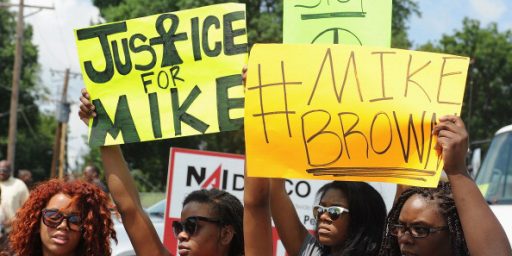James Q. Wilson Dead at 80
The great political scientist James Q. Wilson died this morning at the age of 80.
Boston Globe (“James Q. Wilson, 80, co-author of ‘Broken Windows’ community policing strategy, died today“):
James Q. Wilson, a political scientist who coauthored the influential “Broken Windows” article in The Atlantic Monthly in 1982, which became a touchstone for the move toward community policing in Boston and cities across the country, died early this morning in Beth Israel Deaconess Medical Center.
He was being treated for leukemia, according to a family friend.
Dr. Wilson, who was 80 and lived North Andover, returned to Boston a few years ago to become the first senior fellow at the Clough Center for the Study of Constitutional Democracy at Boston College, and a distinguished scholar in the college’s political science department.
He had taught at Harvard University for 26 years before leaving in the late 1980s for California, where he had grown up, to teach at the University of California, Los Angeles, and Pepperdine University.
Considered one of the nation’s most significant thinkers about crime and other urban matters, Dr. Wilson cowrote the Atlantic article with George L. Kelling.
The article, Dr. Wilson said last year in an interview with The Wall Street Journal, suggested that “public order is a fragile thing, and if you don’t fix the first broken window, soon all the windows will be broken.”
Kelling and Dr. Wilson wrote in the Atlantic that “at the community level, disorder and crime are usually inextricably linked, in a kind of developmental sequence. Social psychologists and police officers tend to agree that if a window in a building is broken and is left unrepaired, all the rest of the windows will soon be broken. This is as true in nice neighborhoods as in rundown ones. Window-breaking does not necessarily occur on a large scale because some areas are inhabited by determined window-breakers whereas others are populated by window-lovers; rather, one unrepaired broken window is a signal that no one cares, and so breaking more windows costs nothing. (It has always been fun.)”
Addressing the implications of that first broken window, rather than letting the domino effect of disorder take its course, became an approach embraced by policy-makers.
“Police ought to protect communities as well as individuals,” Kelling and Dr. Wilson wrote in concluding their article. “Our crime statistics and victimization surveys measure individual losses, but they do not measure communal losses. Just as physicians now recognize the importance of fostering health rather than simply treating illness, so the police — and the rest of us — ought to recognize the importance of maintaining, intact, communities without broken windows.”
With Samuel Huntington having preceded him in death, Wilson was quite probably the greatest living political scientist*. With both gone, no obvious single candidate comes to mind for that title.
_________
*By which I mean political scientist as scholar. There are plenty of political science PhDs who have excelled in the world of public policy.
Artist’s sketch by Zina Saunders for WSJ






He was the author of the textbook used in my Advanced Placement American Government class. As such, the source of the majority of my book learning on government and politics. RIP.
His influence was not entirely positive. While I doubt it was his intent, his broken window theory has become one of the big justifications for the militarization of policing, and the practice of treating law enforcement like an occupation is increasingly destroying the relationship between the police and the general public.
@Stormy Dragon: But that’s a bit like blaming Karl Marx for Joseph Stalin or the ancient Greeks for Michele Bachmann.
Stormy D.
Have you forgotten what came before broken windows. One of the highest crime rates in the U.S. and the insistence of the left that crime was a social work program. Maybe you should rewatch “Death Wish” from 1974 to remember the popular view of cities in the 70’s.
@James Joyner:
He wasn’t personally responsible, but when evaluating the results of someone’s policy recommendations, don’t we have to consider the pracitcal results when they were put into effects, rather than just the anticipated theoretical results? People may not blame Karl Marx personally for Stalin, but communism does not exactly enjoy widespread popularity as a result of it repeatedly leading to people like Stalin.
@superdestroyer:
Except that crime dropped everywhere since the 70s, regardless of whether we consider cities that adoptted Wilson’s policies or didn’t. Once you control for other factors, the no-broken-windows policy itself shows no statistically signigicant improvement (there’s a nice chapter in Freakonomics about exactly this subject). The enduring myth that Wilson’s policies caused the drop in crime is just a case of Cum Hoc Ergo Propter Hoc.
Or, I could recognize that action movies, however entertaining, shouldn’t be treated as serious public policy arguments.
@Stormy Dragon:
Sorry but you’re high off your ass. Broken windows was not a justification for militarization. The justification for militarization was the alleged presence of assault weapons by criminals. And why wouldn’t law enforcement be treated as an occupation? Or are you trying to say that law enforcement in an occupation of the community.
@bandit:
Yes, I meant occupation in the sense of the police thinking of themselves as an outside force charged with imposing control on a hostile region. And the problem with militarization isn’t just the “tacticool” mall ninjas, but also the fact that police seeing their role as imposing control on the community rather than serving the needs of the community.
And the “we need to come down as hard as possible on every little thing that happens or the civies will start acting out of place again” mindset that results when Wilson’s policy are implemented is a big source of that us vs. them mindset.
@Stormy Dragon:
It comes down to the Peelian Principles that (until recently) defined modern policing:
Wilson rejected a number of these principles, particularly the ninth, and law enforcement has not benefited from that.
The followers of Wilson’s theory dumped all manner of non-public safety problems, inappropriately, into the lap of law enforcement. Any resident with a problem became a crack in a window. It was put on police agencies to address and it made the phone number “911” the access point to all governmental services.
I studied Wilson in college and worked the streets in uniform in the heyday of “Community Policing.” What began as a “holistic” approach to dealing with issues of crime and safety evolved into police delivered social services. It was not Wilson’s ideas that caused this, but the shortsighted implementation of them. Wilson had his head and his heart in the right place.
The police are not militarized. Sure, SWAT teams have implemented military tactics and deploy military equipment. Even patrol officers receive more tactical training in light of incidents at North Hollywood, Columbine, etc. The media likes to focus on those incidents where police officers are wearing military styled clothing, or using equipment associated with the military because it is sensational. Ninety-nine percent of all police officers still carry a handgun and handcuffs and spend most of their time writing reports and giving directions.
Wilson, like Jane Jacobs before him, was promoting a comprehensive approach to social issues. Wilson focused on crime and safety. He rightfully pointed out that crime does not exist in isolation of other factors in a community which should be addressed in ways traditional policing is not suited.
@Advo-cop:
Again, by militarization, I’m not talking necessarily about the equipment, I’m talking about the mindset of police, who look at themselves as fighting a war against the rest of the public, rather than as public servants. Nearly every day now brings newstories that basically result from some cop deciding that a civilian isn’t showing them due defference and needs to be made an example of, to make sure everyone else remembers who’s in charge.
These stories are news precisely because they deviate from the norm.